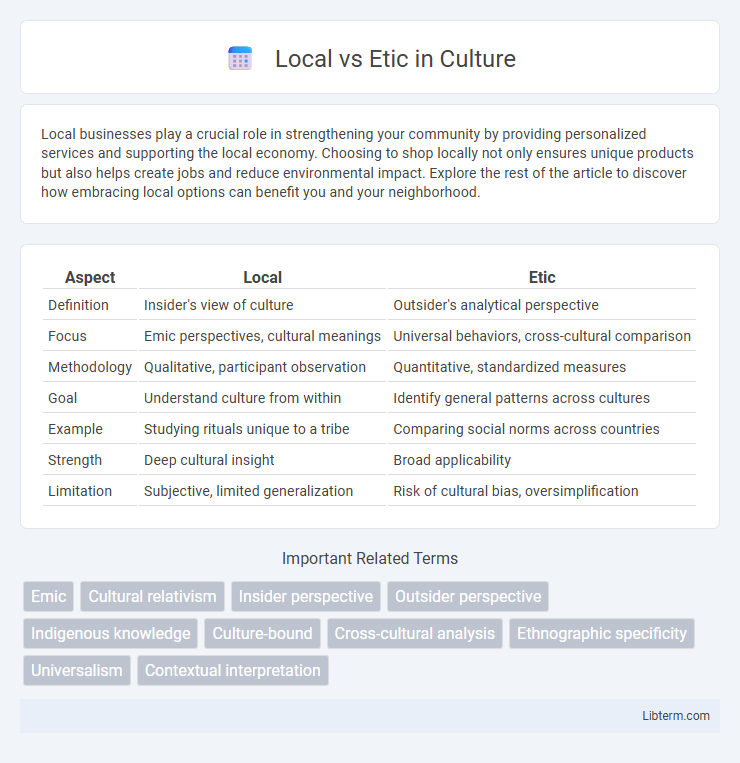Local businesses play a crucial role in strengthening your community by providing personalized services and supporting the local economy. Choosing to shop locally not only ensures unique products but also helps create jobs and reduce environmental impact. Explore the rest of the article to discover how embracing local options can benefit you and your neighborhood.
Table of Comparison
| Aspect | Local | Etic |
|---|---|---|
| Definition | Insider's view of culture | Outsider's analytical perspective |
| Focus | Emic perspectives, cultural meanings | Universal behaviors, cross-cultural comparison |
| Methodology | Qualitative, participant observation | Quantitative, standardized measures |
| Goal | Understand culture from within | Identify general patterns across cultures |
| Example | Studying rituals unique to a tribe | Comparing social norms across countries |
| Strength | Deep cultural insight | Broad applicability |
| Limitation | Subjective, limited generalization | Risk of cultural bias, oversimplification |
Introduction to Local and Etic Perspectives
Local perspectives emphasize understanding cultural behaviors and meanings from within the community, highlighting insider viewpoints and context-specific knowledge. Etic perspectives analyze cultural phenomena from an outsider's viewpoint, aiming for objective comparison and universal principles across cultures. Both approaches are essential for comprehensive anthropological research, balancing subjective cultural experiences with objective analytical frameworks.
Defining Local (Emic) and Etic Approaches
Local (Emic) approaches emphasize understanding cultural phenomena from within the social group, prioritizing insiders' perspectives, beliefs, and meanings. Etic approaches analyze cultures from an outsider's viewpoint, seeking universal patterns and objective observations across different societies. These contrasting methodologies shape qualitative and quantitative research strategies in anthropology and social sciences.
Historical Background of Local vs Etic Concepts
The concepts of local and etic perspectives originated from linguistic and anthropological studies in the mid-20th century, primarily through the works of Kenneth Pike, who introduced the terms to differentiate between insider (emic) and outsider (etic) viewpoints. Emic approaches focus on understanding cultural phenomena from the perspective of the subject, capturing intrinsic cultural meanings, while etic approaches analyze behaviors and practices through external, comparative frameworks. These concepts have since become fundamental in cross-cultural research, guiding the interpretation of cultural data and influencing methodologies in anthropology, linguistics, and psychology.
Key Differences Between Local and Etic Views
Local views emphasize cultural insiders' perspective, focusing on unique meanings, practices, and values within a specific culture. Etic views analyze behaviors and phenomena from an external standpoint, applying universal concepts and categories across cultures. The key difference lies in insider versus outsider interpretation, with local views prioritizing cultural context and etic views aiming for cross-cultural comparability.
Advantages of the Local (Emic) Perspective
The Local (Emic) perspective offers deep cultural insights by capturing behaviors and beliefs from the insider's viewpoint, ensuring interpretations are contextually accurate and relevant. Emic approaches enhance the richness of qualitative data, revealing nuances that might be overlooked by external frameworks. This perspective fosters greater empathy and understanding in cross-cultural research, improving the validity of findings within specific cultural contexts.
Benefits of the Etic Approach
The etic approach offers a universal perspective by applying standardized criteria across diverse cultures, enabling cross-cultural comparisons and generalizations. It facilitates the identification of common patterns in human behavior and social structures, supporting the development of broad theories in anthropology and psychology. Researchers benefit from its objectivity and replicability, which enhance the reliability and validity of findings across different cultural contexts.
Case Studies: Local vs Etic in Practice
Case studies comparing local and etic approaches reveal distinct advantages in cultural research, with local methods providing in-depth, context-specific insights that capture unique societal norms and behaviors. Etic perspectives offer comparative frameworks across cultures, facilitating broader generalizations and theory testing but may overlook nuanced local meanings. Effective research often integrates both approaches, harnessing local specificity and etic universality to enhance validity and cultural relevance.
Challenges in Balancing Local and Etic Approaches
Balancing local and etic approaches poses significant challenges due to the inherent tension between culturally specific insights and universal frameworks used in research and practice. Local approaches emphasize contextual understanding and cultural sensitivity, while etic perspectives strive for generalizability and comparability across cultures, often leading to conflicts in methodology and interpretation. Researchers must carefully navigate these differences to avoid ethnocentrism and ensure valid, reliable, and culturally respectful outcomes.
Implications for Research and Policy
Local approaches emphasize context-specific knowledge, enhancing cultural relevance and community engagement in research, which leads to tailored policy interventions that effectively address unique social issues. Etic perspectives allow for cross-cultural comparisons and generalizable findings, supporting broader policy frameworks and enabling scalability of solutions across diverse populations. Combining local insights with etic frameworks optimizes research validity and policy impact by balancing specificity with universality.
Conclusion: Integrating Local and Etic Insights
Integrating local and etic perspectives enhances cross-cultural research by combining insider viewpoints with universal frameworks, ensuring a more comprehensive understanding of cultural phenomena. Utilizing local insights allows for context-specific interpretations, while etic approaches enable comparison across cultures, fostering balanced analysis. This integration promotes culturally sensitive methodologies that respect diversity while identifying common patterns.
Local Infographic

 libterm.com
libterm.com